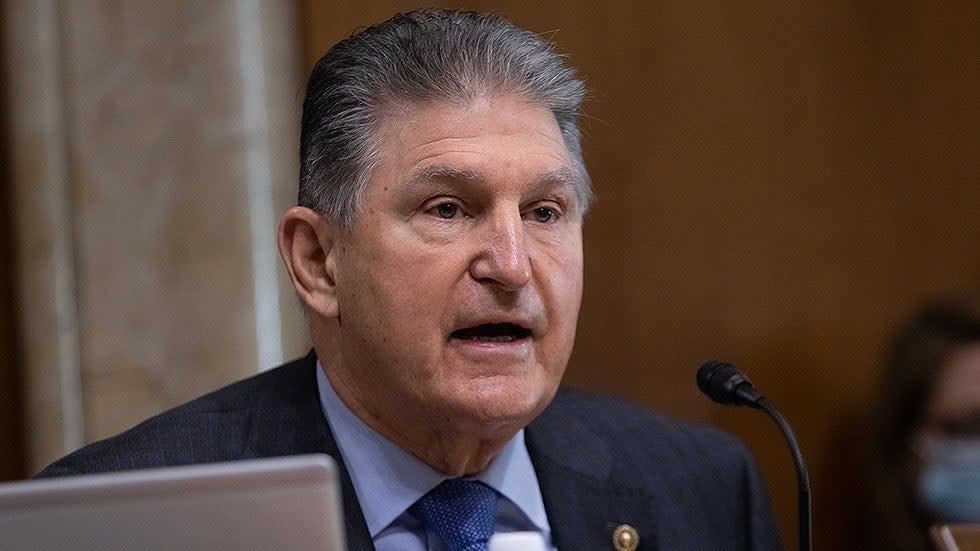Manchin would oppose second high court nominee right before 2024 election

- Oops!Something went wrong.Please try again later.
- Oops!Something went wrong.Please try again later.
- Oops!Something went wrong.Please try again later.
Centrist Sen. Joe Manchin (D-W.Va.) on Monday said he would not support confirming another nominee selected by President Biden for the Supreme Court immediately before the 2024 presidential election, clarifying remarks he'd made earlier about the midterm elections.
Manchin said he would prefer to wait until the country knows who will occupy the White House in 2025.
Manchin walked back the comment he made earlier afternoon indicating that he would not support confirming a second Biden nominee to the Supreme Court if another vacancy occurs shortly before the Nov. 8 midterm election.
Asked if the Senate should act if another seat becomes vacant "later in the year closer to the election," Manchin responded: "I'm not going to be hypocritical on that."
"If it comes a week or two weeks before like it did with our last Supreme Court nominee, I think that's a time it should go to the next election," he said.
Manchin's comments immediately attracted attention on Twitter after several reporters posted his comments.
He then explained to reporters that he "misspoke" and that he would only support holding up a Supreme Court confirmation proceeding immediately before the next presidential election.
"I was referring to that election, before a major presidential election," he said.
That's the position he and other Democrats took in the fall of 2020 after Ruth Bader Ginsburg died in September of that year.
Democrats insisted that then-Senate Majority Leader Mitch McConnell (R-Ky.) wait until after the election to move a nominee so that the winner of the presidential contest could make the choice - the same position McConnell took in 2016 when he blocked President Obama's Supreme Court nominee Merrick Garland from getting a Senate hearing or vote.
Manchin was outspoken in opposing McConnell's plan to speed President Trump's third Supreme Court nominee, Amy Coney Barrett, through the Senate confirmation process before the 2020 presidential election.
"Rushing to confirm a Supreme Court nominee weeks before a presidential election has never been done before in the history of our nation and it will only fan the flames of division at a time when our country is deeply divided," he said at the time.
"I cannot support a process that risks further division of the American people at a time when we desperately need to come together. I will not vote to confirm Judge Coney Barrett or any Supreme Court nominee before Election Day on November 3rd. I urge my Republican friends to slow down, put people before politics, and give their constituents a chance to vote."
Moderate Republican Sens. Susan Collins (Maine) and Lisa Murkowski (Alaska) joined Manchin in calling for Republicans to await the outcome of the election to let the winner pick Ginsburg's successor.
Collins at the time cited the treatment of Garland in 2016 as the reason why she wanted to hit the pause button on Trump's nominee.
"When the Senate considers nominees to the United States Supreme Court, it is particularly important that we act fairly and consistently, using the same set of rules, no matter which political party is in power," she said in late October 2020.
Murkowski voted against a motion to end debate on Barrett's nomination and advance her nomination. But she voted "aye" on the final confirmation vote.
"I voted no on the motion to proceed yesterday because I have stated on multiple occasions since 2016 I do not believe the Senate should take up a Supreme Court nomination this close to a presidential election," she said, explaining her "no" vote on the procedural motion.
Manchin voted to confirm Trump's second nominee to the Supreme Court, Justice Brett Kavanaugh, weeks before the 2018 midterm elections. He was the only Democrat to vote for Trump's pick after a bruising confirmation battle.
This story was updated at 6:37 p.m.

